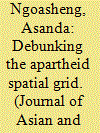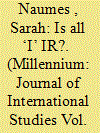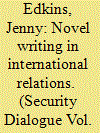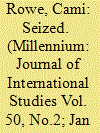|
|
|
Sort Order |
|
|
|
Items / Page
|
|
|
|
|
|
|
| Srl | Item |
| 1 |
ID:
100476


|
|
|
| 2 |
ID:
178253


|
|
|
|
|
| Summary/Abstract |
Traditional universities are often interrogated on their pedagogic underpinnings, while universities of technology are often left unchallenged on knowledge production. Universities of technology are often assumed to be transformed because they are a post-apartheid creation, with a mainly black, working-class student body. This assumption has led to little interrogation of the university of technology and its relationship with knowledge production. This paper explores the nature of curriculum contestation and reform at a university of technology. It outlines the historical context of a university of technology and its approach to curriculum development, which has implications for current curriculum transformation efforts. Using autoethnographic research methodology, the paper tracks a multi-year journey towards the development of a transformative, socially just curriculum intervention in the extended curriculum programme for the Architecture and Interior Design programme at a university of technology. The paper concludes that curriculum change does not happen in a vacuum, that it is political, difficult and emotionally taxing, and that it is best done in collaboration with different education stakeholders.
|
|
|
|
|
|
|
|
|
|
|
|
|
|
|
|
| 3 |
ID:
097925


|
|
|
|
|
| Publication |
2010.
|
| Summary/Abstract |
This article queries the place of autoethnography in the study of International Relations as it relates to questions of truth, power, and ethics. The traditional denial of the authorial presence of the self in IR scholarship has been increasingly challenged in recent years, and autoethnography is perhaps the most obvious example of this. This article utilises autoethnography to explore some of the pitfalls and dilemmas associated with the approach - particularly the dangers surrounding 'standpoint' epistemologies, and the need to continue to distinguish between scholarship and storytelling. The article does not dismiss these concerns, but seeks to illustrate the ways in which the discipline is already engaged in storytelling as it narrates its own history and development. At the same time, the article seeks to 'guard against a generation of novelists' whose training would inevitably devolve into a question of crafting the 'prettiest sentence.' Mindful of these concerns, the article nevertheless seeks to demonstrate the ethical value of autoethnography in its exploration of the limitations of academic voice and its impact on those we write, the truths we are able to recognise and transcribe, and the ways in which the academic voice silences the self, who is forced to hide or minimise the often very personal motivations for engaging in IR scholarship. It argues that purposeful autoethnography should have a place among the diverse approaches to IR.
|
|
|
|
|
|
|
|
|
|
|
|
|
|
|
|
| 4 |
ID:
100475


|
|
|
| 5 |
ID:
139419


|
|
|
|
|
| Summary/Abstract |
Narrative approaches to International Relations have steadily increased in popularity in recent years. As narrative has gained further acceptance among other methodological traditions in International Relations, it has also provoked questions about the sort of restrictions that should be placed on academic writing in general and narrative writing in particular. Narrative approaches have faced challenges that ask whether they allow room for critique or if they necessarily turn into standpoint epistemologies. This author views narrative approaches as both valid and necessary in addition to the stable of other methods utilised in International Relations scholarship. However, in order for narratives to contribute effectively, they must be subject to critique. This article proposes two questions that both authors and readers should ask when engaging with narrative: 1) Does the narrative disrupt notions of congruity in political thought? Does it bring to light contradictions that may otherwise be ignored? 2) Does the narrative make room to incorporate those who have been excluded from political science discourse? Through asking these questions, International Relations scholars who utilise narrative approaches can open the field to novel lines of inquiry.
|
|
|
|
|
|
|
|
|
|
|
|
|
|
|
|
| 6 |
ID:
140444


|
|
|
|
|
| Summary/Abstract |
In what ways can refugees be both cosmopolitan and diasporic? This article juxtaposes published memoirs with material from ethnographic research in order to analyse the discursive frameworks through which Vietnamese Americans of the 1.5 generation negotiate both diasporic imaginaries and cosmopolitan aspirations. The collective memories of the Vietnam War that circulate in the Vietnamese American diaspora place obstacles in the path of a younger generation who aspire to be cosmopolitans, but are entangled in memories of the trauma and dislocation of the war and must also respond to a pervasive ideology of anti-communism, which is a form of anti-cosmopolitanism, among the first generation. This case study points to the ways in which our current scholarly efforts to expand ideas of both diaspora and cosmopolitanism to include a variety of positions and aspirations can benefit from more attention to the modes of cultural expression produced by the populations we study.
|
|
|
|
|
|
|
|
|
|
|
|
|
|
|
|
| 7 |
ID:
122648


|
|
|
|
|
| Publication |
2013.
|
| Summary/Abstract |
Prompted by Elizabeth Dauphinee's The Politics of Exile, the article explores the political potential of novel ways of writing in international relations. It begins by examining attempts to distinguish between narrative writing and academic writing, fiction and non-fiction, and to give an account of what narrative might be and how it might work. It argues that although distinctions between narrative writing and academic writing cannot hold, there are nevertheless ways of judging the practical political effects that writing can produce. It briefly examines feminist, postcolonial and other international relations scholars who collect other people's stories or tell their own, and points to an instructive body of work in fiction and literary non-fiction beyond the discipline. It argues that writing that disrupts linear forms of temporality and instead inhabits 'trauma time' can open the possibility of an aesthetic political practice, and suggests that we foster such a creative practice in international relations.
|
|
|
|
|
|
|
|
|
|
|
|
|
|
|
|
| 8 |
ID:
188968


|
|
|
|
|
| Summary/Abstract |
This article relates the autoethnographic lived experiences of the participant of a religious sojourn and the ensuing implications for imbibing the sacred. Drawing on the site of the Tablighi Jamaat’s 40-day khuruj in Pakistan, the author focuses on the beginning, middle, and end periods of the travel to expand on Eliade’s notion of sacred time as one that is fraught with continuous conflicts with the profane. The article concludes that experiencing spirituality in modernity requires considerable physical and mental effort apart from physically transcending the boundaries of space and time.
|
|
|
|
|
|
|
|
|
|
|
|
|
|
|
|
| 9 |
ID:
184134


|
|
|
|
|
| Summary/Abstract |
This article examines representations of border security within public museums, through the example of the UK Border Force National Museum. It begins by discussing the way that international borders are theatrically experienced, and the parallel characteristics of museum spaces. I then suggest the value of performance autoethnography when analysing such phenomena, which arises from the ability to creatively situate personal experience alongside institutional scripts of border control. The article then presents a performance autoethnography that illustrates my experiences within the Border Force Museum. This provides new insights into the theatrical framing of the museum and its effect on visitor interpretations. The article demonstrates that the Border Force Museum replicates the theatricality of border control sites, and thus supports the ordering of bodies into insiders and outsiders; however, creative methods for knowledge production might offer a means of challenging existing border taxonomies, especially when personal experience is circulated through theatrical means.
|
|
|
|
|
|
|
|
|
|
|
|
|
|
|
|
| 10 |
ID:
079652


|
|
|
|
|
| Publication |
2007.
|
| Summary/Abstract |
This article explores the complex processes and emotions that characterise transnational family reunion. Using the tools of experimental ethnography, it unpacks the experiences of Marcela, a young Australian-Salvadoran, who embarked on a family reunion with members of her transnationally dispersed family in various locales: London (Ontario), Los Angeles, various towns in El Salvador, and Managua in Nicaragua. Her account of the family reunion affords an opportunity to understand the cultural complexities and emotional dynamics of these events. The encounters between guests (Marcela's family) and hosts gave rise to issues of reciprocity, envy, and guest-host dynamics. These dynamics were place specific, resulting in a much higher degree of spontaneity in encounters with other exiled family members, indicating both the shared experiences of exile and the realities, and perceptions, of socio-economic status. While the politics of reciprocity was an explicit feature in all trans-national encounters experienced by Marcela's family, it was Marcela's "cultural Australianness" that served as a constant reminder of how becoming a trans-national had changed her permanently and marked her out from her kin.
|
|
|
|
|
|
|
|
|
|
|
|
|
|
|
|
| 11 |
ID:
169161


|
|
|
|
|
| Summary/Abstract |
The purpose of this article is to introduce and explore the political potential of visual autoethnography. I do so through my experience of working as a Swiss Army officer in the Korean Demilitarized Zone (DMZ). Drawing on my own photographs I examine how an appreciation of everyday aesthetic sensibilities can open up new ways of thinking about security dilemmas. I argue that visual autoethnography can be insightful not because it offers better or even authentic views – it cannot – but because it has the potential to reveal how prevailing political discourses are so widely rehearsed and accepted that we no longer see their partial, political, and often problematic nature. I illustrate this potential in two ways: (1) how a self-reflective engagement with my own photographs of the DMZ reveals the deeply entrenched role of militarised masculinities; (2) how my positionality and my photographs of everyday life in North Korea show that prevailing security discourses are highly particular and biased, even though they are used to justify seemingly objective policy decisions.
|
|
|
|
|
|
|
|
|
|
|
|
|
|
|
|
|
|
|
|
|